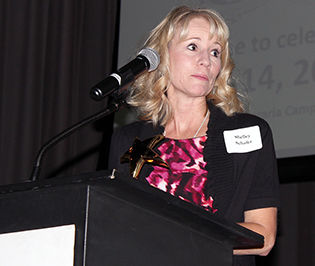Fifteen years later, Colorado makes permanent an anti-poverty tax credit for working families

It’s a wonky tax program that puts hundreds and thousands of dollars into the pockets of low-income workers.
Researchers call it the best general anti-poverty program going and laud it in particular as a low-cost, high-return policy that lifts up working parents when they need it most and benefits the children of those parents over the long term.
It has been championed on the left and right in Washington, even while winning only rocky support in Colorado – and in recent years not much of any support from Republicans in the state.

Which is why local fiscal policy watchers celebrated last week when it seemed certain that the state version of the Earned Income Tax Credit would go into effect for Colorado residents permanently after 15 years of dogged work that included number crunching, community outreach, hardcore lobbying at the Capitol and a 1999 eleven-stop weekend barnstorming tour of the state in a four-seat airplane flown by Republican state Rep. Gary McPherson, the Aurora lawmaker who sponsored the first state version of the credit and who became a sort of patron saint of the idea when he died a year later, in a plane crash in Canada.
“McPherson didn’t stop,” said Carol Hedges, director of the Colorado Fiscal Institute and emcee at a celebration event last Wednesday sponsored by the University of Colorado School of Public Affairs and held at the Tivoli Center in downtown Denver. “His advocacy wasn’t confined to the Capitol building. He flew across the state to tell people they had to file for this credit… The cash goes to working moms and flows directly into the local economy, to mechanics and haircutters.
“McPherson was a statesman and family man and a friend, and he will not be forgotten.”
When it was her turn to speak, Shelley Schafer, McPherson’s widow, seemed slightly stunned by the rush of news from the past. The event celebrating the triumph of McPherson’s bold policy proposal came just two days from the day his plane went down outside of Vancouver on October 12, 2000, when he was 37 years old. McPherson had proposed a state tax credit equal to 30 percent of the federal credit. The version that will take effect next year will deliver 10 percent of the federal credit.
“Thank you all for recognizing Gary’s contribution,” Schafer said, flanked by McPherson’s two grown daughters. “He would have been so happy to learn that the bill passed and that it will help so many families.”
Later Schafer told The Colorado Statesman that she didn’t remember much about the fight for the Earned Income Tax Credit or even about the barnstorming tour that took her husband and his passengers – supporters of the credit from the Colorado Women’s Lobby – to cities up and down the Front Range and the West Slope.
“He was always flying somewhere, and I definitely didn’t go with him on that tour – it was a tiny plane, four seats, there was no room.”
Versions of the tax credit passed over the years were temporary and only kicked in when the state made a fairly high Taxpayer Bill of Rights surplus – about $84 million, which hasn’t happened in years, since the economic downturn of 2007 and the uneven recovery that has followed. But Democrats in control of the Legislature in 2013 passed a new version of the credit. It will kick in when the surplus hits about $100 million, and this time it will be permanent.
In September, state fiscal forecasts for next year put the surplus at the $100 million mark.
Roughly 350,000 Colorado families qualify for the credit each year, including 39,000 military families, 289,000 working mothers and 18 percent of all rural Coloradans.
Roughly 118,000 families who qualify don’t collect it, mostly because they don’t know it exists.
This year, single people who make less than roughly $15,000 and working parents who make less than roughly $50,000 a year qualify. Single people on average receive about $300. Parents receive about $3,000.
Kathy White, deputy director at the Colorado Fiscal Institute, said the Earned Income Tax Credit was always popular on the right and the left. It originated in the 1970s with iconic conservative Chicago school economist Milton Friedman, who thought the best way to fight poverty was not by setting up bureaucratic welfare programs but by giving low-income Americans money in the form of a “negative income tax,” or life subsidy. The negative income tax was teamed with proposals to lower income tax rates across the board – the thinking being that people in all income brackets would have more money to put into the economy.
“This tax credit has been supported by presidents since Gerald Ford – Carter, Reagan, Bush, Obama,” said White. “Even today, (Wisconsin GOP Rep.) Paul Ryan sometimes pairs it with wage policy in his budget proposals. Republicans see it as a way to raise wages for working people without pressing on business.”
Colorado Public Radio did some number crunching last spring and found that, for a single mother with one child earning the $8.23 minimum wage in Colorado, the federal Earned Income Tax Credit alone would translate to an additional $1.59 an hour. Add in the new Colorado credit and that effect rises another $0.16, which means an extra $6.40 per week in pocket, or an hourly salary equal to $9.98.
“People think $300 or even $3,000 a year isn’t a lot of money. Let me tell you, it is so much money,” said Desirae Sarabia, an associate with Gary Community Investments. Years ago, Sarabia was a teen mom and worked part time to put herself through college. “When you’re poor, there’s no money to save. You can’t fix your car. You can’t plan ahead financially. Poverty is about living day to day. You live paycheck to paycheck. That’s the condition of poverty.”
When the tax credit comes, White said, “people tell me they can afford to buy diapers in bulk, they can buy car insurance for a half-year at a time. One woman said she sent her kid to swimming lessons. Now that child has a skill for life.”
Hedges, talking about the value of the tax credit, quoted Diane DiGiacomo, former spokesperson for the Piton Foundation.
There is plenty of data collected over the long term that shows the benefits of the Earned Income Tax Credit, Hedges said, but the beauty is that it isn’t really a program.
“As Diane once put it, ‘Sometimes people don’t need another program. They just need more money.'”
– john.tomasic@gmail.com














